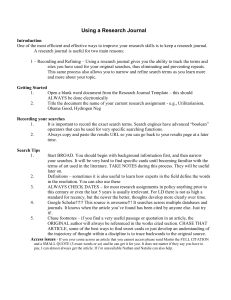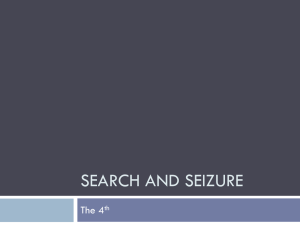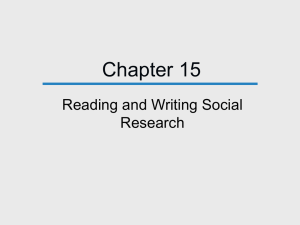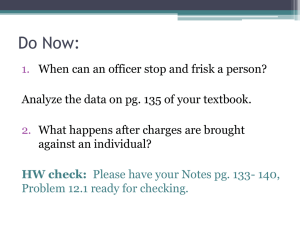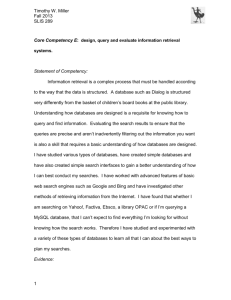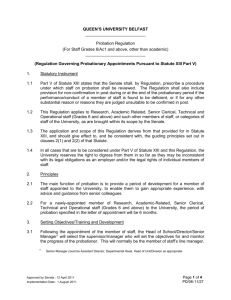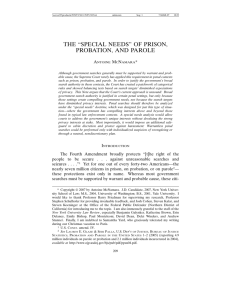Inspections and Regulatory Searches
advertisement
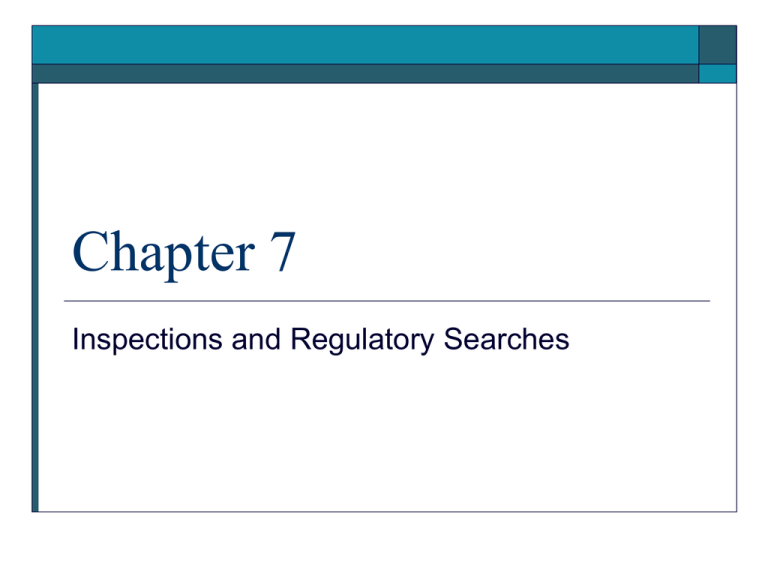
Chapter 7 Inspections and Regulatory Searches Introduction administrative searches “special needs” searches primarily are carried out by public agencies that are not part of the police they are not aimed at investigating a specific crime burden of proof whether individuals and businesses are following local ordinances violation of the law typically results in a civil fine do not serve the ordinary needs of law enforcement are not undertaken to investigate a crime or to gather evidence of a crime U.S. Supreme Court: the government interest in conducting these searches outweighs the resulting intrusion on individual rights Administrative Inspections undertaken to insure that individuals and businesses are conforming to a broad range of agency regulations violation may result in both a civil fine and a criminal conviction criminal liability also may result when the administrative violation violates a separate criminal statute Camara v. Municipal Court: administrative inspections (without a warrant) for housing code violations are entirely reasonable under the Fourth Amendment administrative warrants can be based on “modified probable cause” Admin. Insp. (cont.) “area warrants” may authorize blanket actions, such as the search of every building of a particular age or design See v. City of Seattle: to conduct forced inspections, the inspector is required to demonstrate only that the business is the type of structure that is subject to inspection New York v. Burger: closely regulated business exception evidence of a crime that is discovered in plain view during an administrative search may be seized by the police Legal Equation Special-Needs Searches intended to promote the safety and welfare of individuals and of the public two-step analysis to establish that the search is directed at a special need “beyond the special needs of law enforcement” evaluate the reasonableness of the search Legal Equation International Borders borders exception Almedia-Sanchez v. United States routine border searches nonroutine border searches Legal Equation Motor Vehicle Checkpoints Delaware v. Prouse: police may not pull motor vehicles over to “spot check” for drivers’ licenses and registration without reasonable suspicion United States v. Martinez-Fuerte: police are allowed to set up immigration checkpoints Michigan Department of State Police v. Sitz: sobriety checkpoints, suspicionless checkpoint program is reasonably effective City of Indianapolis v. Edmond: checkpoints whose primary purpose is the detection of narcotics are unconstitutional emphasis on public safety Legal Equation Airport Screening special need to subject individuals to both a preboarding “walk-through screening” and a handheld magnometer “wanding” without reasonable suspicion special need to x-ray and to inspect carry-on and checked baggage for weapons and explosives judges have affirmed the right of airport personnel to conduct even more intrusive searches where there is an indication that a passenger may be in possession of a weapon or explosive based on the vital interest in preventing airborne terrorism and in providing for the safety and security of the public Workplace Drug Testing concern over the sobriety of individuals working in the transportation industry whose job performance may threaten the safety of the public Skinner v. Railway Labor Executives’ Association blood, breath, and urine tests constitute Fourth Amendment searches they do invade individuals privacy but this invasion is outweighed by the government interest in safety no search warrant required only suspicionless testing under specific circumstances is allowed Searches in High Schools in loco parentis students are entitled to constitutional rights and protections Tinker v. Des Moines Independent Community School District Morse v. Frederick New Jersey v. T.L.O. Drug Testing in High Schools Vernonia School District 473 v. Acton the legitimate governmental interest in carrying out drug tests outweighed the modest intrusion on the diminished privacy interests of students schools have a duty to protect and to educate children students have a diminished expectation of privacy, and athletes have even less of an expectation of privacy than the average student drug tests are conducted in a relatively unintrusive fashion teachers are not trained to make reasonable-suspicion determinations of drug use Board of Education of Independent School District No. 93 of Pottawatomie County v. Earls: court upheld drug tests for athletes Probation and Parole Griffin v. Wisconsin probation officers can search the home of a probationer if there are “reasonable grounds” to believe that contraband or any other item that a probationer is prohibited from possessing is present a probationer remains in legal custody of the state and typically is required to report to a probation officer and satisfy the officer that he or she is satisfying various conditions probationers and parolees enjoy only a “conditional liberty properly dependent on observance of special [probation] restrictions” Probation and Parole (cont.) United States v. Knights searches of probationers’ homes have to be immediately and regularly conducted “when an officer has reasonable suspicion that a probationer subject to a search condition is engaged in criminal activity, there is enough likelihood that criminal conduct is occurring that an intrusion on the probationer’s significantly diminished privacy interests is reasonable” this judgment was based on “ordinary Fourth Amendment analysis” and was not a “special needs” or “administrative” search case Correctional Institutions Hudson v. Palmer prisoners “are not beyond the reach of the Constitution” and retain those rights that are not “fundamentally inconsistent with imprisonment itself or incompatible with the objectives of incarceration” a right to privacy is “fundamentally incompatible with the close and continual surveillance of inmates and their cells required to ensure institutional security and internal order” Correctional Institutions (cont.) Bell v. Wolfish the U.S. Supreme Court approved visual cavity inspections in those instances in which a pretrial detainee or inmate returned to his or her cell block following a contact visit with an individual from outside the institution these visual cavity searches are reasonable because the need to deter the smuggling of weapons, drugs, and other prohibited items outweighed the intrusion into individual’s privacy interests
